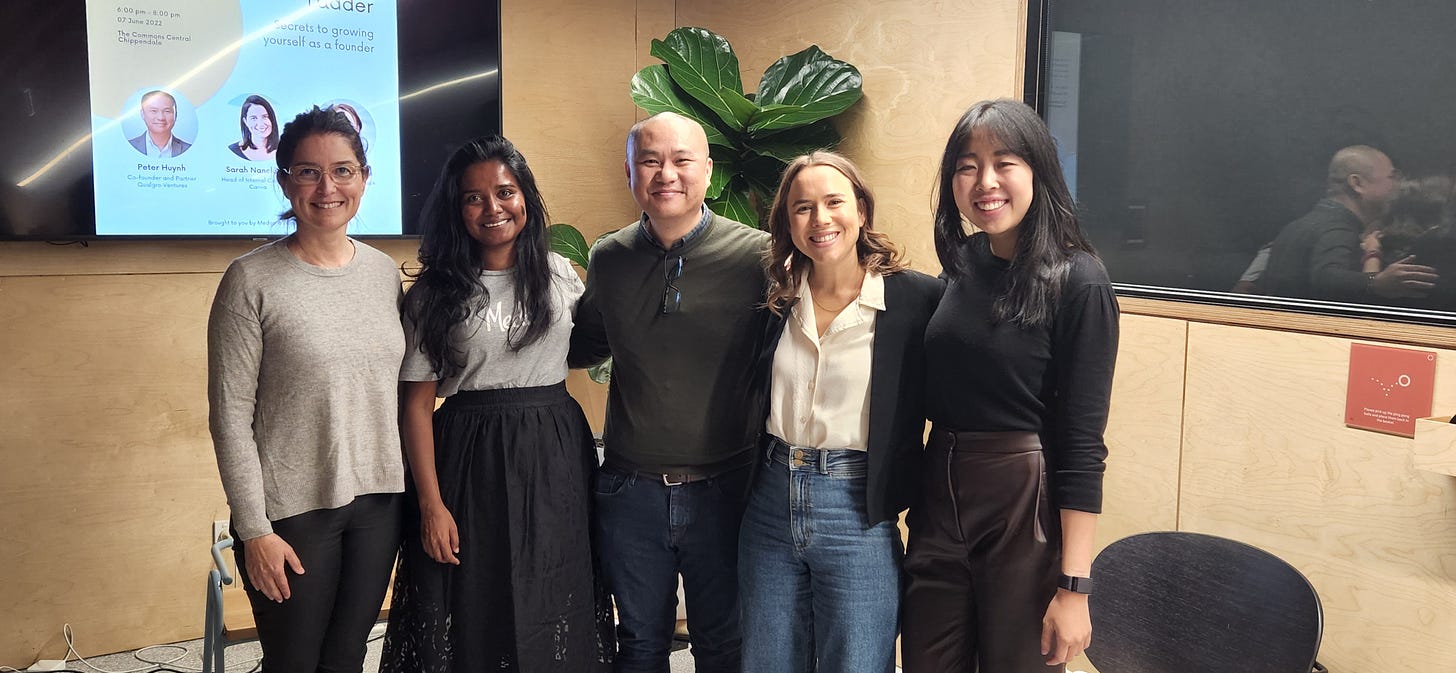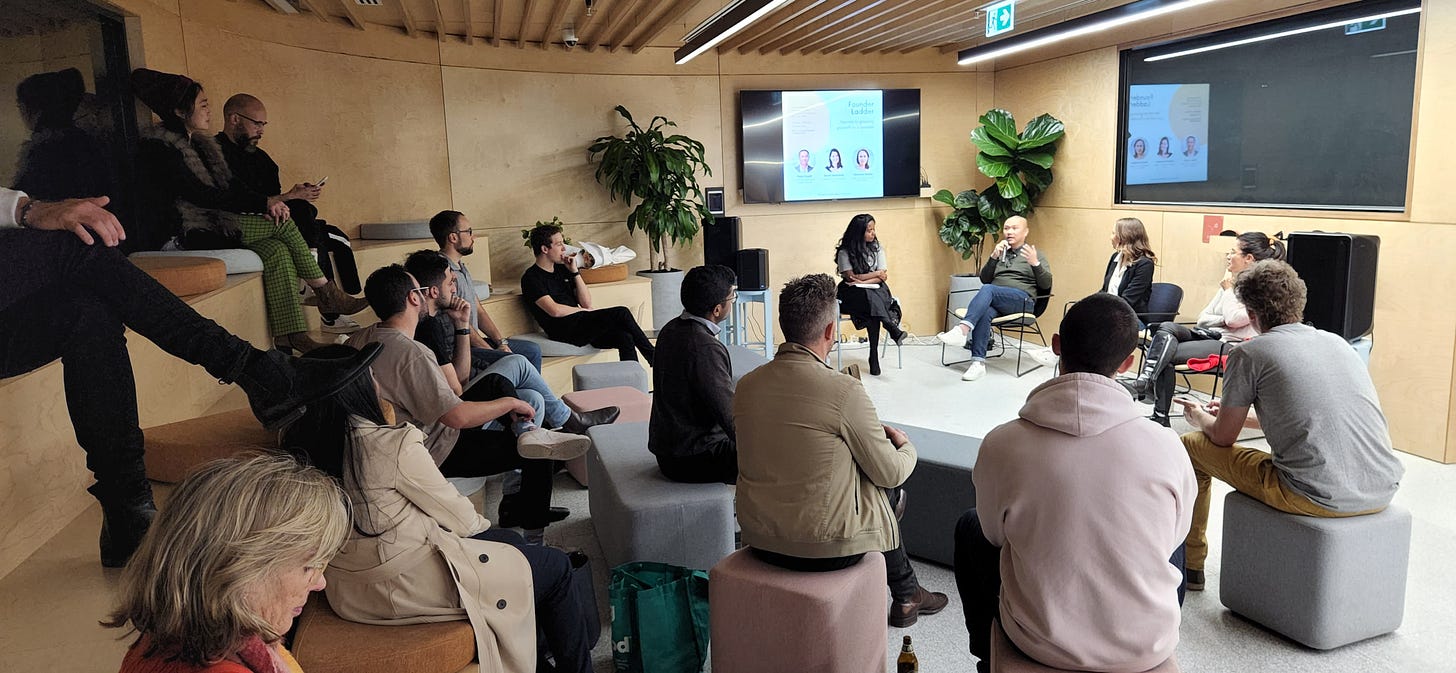Coach Secrets: Thriving through the pressures of being a startup founder, Part 1
A recap of our 'Founder Ladder' event, organised with our friends at Earlywork
The early days of a startup can be very intense and founders may face many challenges. At Medoo we thought it would be good to hear from founder & leadership coaches on these challenges and explore ways in which founders can grow through them.
So, in early June we ran our first coaching panel event together with Earlywork, “The Founder Ladder: Secrets to Growing Yourself as a Founder”. It was a pleasure to host our panellists, co-organisers and audience of founders from the Sydney tech community for a wonderfully cosy winter evening chat.

Our Panellists
We had three incredible coaches as our panellists, Peter Huynh, Veronica Mason and Sarah Nanclares for the evening.
Peter is the Co-Founder and Partner at Qualgro Ventures, a venture capital fund based in Singapore. ‘Qualgro‘ stands for ‘quality‘ and ‘growth‘, which as Peter joked is what you get when ex-consultants pick names. For the record, we love the name and love that the name has meaning and back-story! Peter has been mentoring and coaching founders and investors in cohorts of three, for the past five years, on his Sunday mornings. He works with each cohort for a period of 3 months, and focusses on mindfulness techniques.
Veronica has a background as a technology lawyer, having worked at Google and Baker Mckenzie in the past, where she had exposure to early-stage companies as well as large companies like Apple. Her journey into coaching began after an accident where she broke her back, as a 23-year old. She discovered personal growth and self-development to help her rebuild her life after the accident. Going through such a life changing event made her conscious of her impact on the world, and left her with a strong desire to give back. Which led her to becoming a coach to help other people grow. Veronica believes that if we all fulfil our potential as individuals, we then have the capacity to create a much better world.
Sarah is the Global Head of Internal Coaching at Canva. Her journey into coaching was through her career in natural medicine, as a practicing naturopath and as the Head of Technical Advisory for a nutrition company. From there she progressed into coaching, and has been a coach for 20 years. She has coached founders, business owners, and leaders, which then led her to Canva, where she has been for the last four years. From the newbie to the tenured leader, Sarah loves coaching everyone, because she sees the their potential. She finds excitement and fulfilment in her work, and loves the fact that she still learns as much from her coachees as they learn from her.
Navigating the pressures as the founder of an early-stage startup
Our first topic of discussion was on how founders can best navigate the early days of a startup, which are often an intense rollercoaster. What are some of the common challenges founders face, and what are some strategies they can apply to get past those challenges?
Peter talked about how he often sees people operate in a ‘fight or flight‘ mode in the early days of a startup. This is because there’s often a limited amount of runway, and there is pressure to demonstrate movement in key metrics, or product-market-fit. It can be very stressful to be under time pressure, and if you have raised money from investors or friends & family, that can add to the pressure as well. However, we operate at our best or when we are in ‘flow’, which is outside of that fight or flight state. So he helps founders to slow down under pressure, and find the space to create this flow state despite the stresses they might be under. This can start by first acknowledging their fears, being gentle and kind to themselves, and nourishing themselves. Once they are able to hold this space, and understand who they are and what they are about, they can then create a strong foundation to build their business and product.
Veronica agreed with Peter’s observations, and added that founders can often feel like this is their one shot. They might also have self-doubt around whether they’re fulfilling their potential. Some tools that Veronica has seen to be helpful in these situations are bringing awareness to your mental state , and then working on your mental fitness. Positive Intelligence is one philosophy that she subscribes to. This helps people measure their ability to respond to circumstances and challenges, and also measures the saboteurs that come up for them in their life. By retraining your saboteurs, you can access your flow state more easily and have a greater capacity to handle stress and pressure. You can also pre-empt those saboteurs before they appear and create the space to assess your options versus reacting to challenging situations.
Staying on this topic, the follow-up question was whether there are specific activities that can help create a calm state of mind when facing these pressures?
Peter described how it’s important to slow down and get to a point of stillness and acknowledge the feelings that are there first. One of the techniques he uses with his coachees is to see whether they can find where the feeling, e.g., anxiety, sits within the body. By performing this exercise, you not only acknowledge the feeling, but also turn it into something tangible. Then, he gets his coachees to simply sit with that feeling, and listen to what it’s trying to say. This exercise helps to build skills around listening intently to yourself. Often Peter’s coachees surprise themselves at what they discover through this process, and arrive at a deeper understanding of the factors behind their feelings.
Sarah built on Peter thoughts and talked about how one of the key principles that she tries to cultivate with her coachees is the concept of intuition. In her experience, building up a strong sense of intuition is an edge with all the leaders that she has worked with. The leaders who were able to deeply listen and embrace their intuition had better outcomes in their businesses and were better able to make good decisions under pressure. Even when they didn’t end up making the ‘right‘ decision, they were more at peace with their decisions, because they knew that their decisions were truthful to who they were at their core. One of the techniques that Sarah uses is similar to the one described by Peter. She gets her coachees to name where in their body they are feeling a certain emotion: whether that is anger, resentment, anxiety or something else, she gets them to label it and place it. This helps people still their minds and creates the space to listen deeply to what is going on within themselves. The vast majority of the time, her coachees walk away with powerful insights or epiphanies once they have been introduced to this.
Veronica also agreed that intuition is a competitive edge for founders, and how certain simple things can help unlock the creative right side of your brain. This can help people build empathy with themselves and others, and help them listen to their intuition. The simple activities she suggested is anything that engages your creative side or makes you feel joy like: meditation, swimming or cooking.
Closing off our first topic in summary, strategies that founders can apply to navigate the rollercoaster of founding a startup can be to: start by acknowledging their emotions and holding space to deeply understand these emotions. By doing this they can create opportunity to get out of fight or flight, and into flow. Then, they can train to identify their saboteurs and build resilience against stressful times. Slowing down, identifying and naming emotions, where they are held in your body, as well as learning to listen and trust your intuition are all great activities to aid in this.
Next we talked about laying the foundations for a great culture within startups, and how founders can approach the new set of challenges that come with growing a company.
We’ll bring this to you in Part 2 of this post, stay tuned!
At Medoo, our mission is to help people design and live intentional lives. We seek to create a deep connection between coaches and their clients by bringing to life a purpose-built coaching companion tool.
We are launching our beta product soon! Join our waitlist, if you haven’t already.






